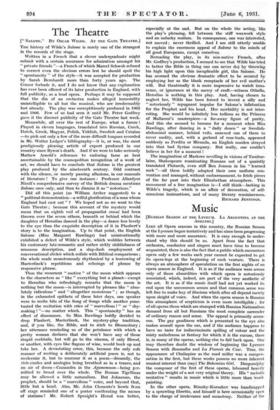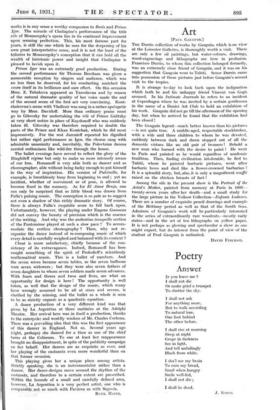Music
[RUSSIAN SEASON AT THE LYCEUM. LA ARGENTINA AT THE ADELPHI.]
LIRE all Opera seasons in this country, the Russian Season at the Lyceum began tentatively and has since been progressing with more and more assurance. It is easy enough to under- stand why this should be so. Apart from the fact that orchestra, conductor and singers must have time to become acquainted, there is also the fact that a public which encounters opera only a few weeks each year cannot be expected to get its opera-legs at the beginning of each venture. There is always an atmosphere of speculation on the first nights of an opera season in England. It is as if the audience were aware only of those absurdities with which opera is notoriously associated, which, indeed, are part of the very aesthetic of the art. It is as if the music itself had not yet worked its end upon the uncommon senses and that common sense was left free to make hay of illusions which after all depend merely upon sleight of voice. And when the opera season is Russian this atmosphere of scepticism is even more intelligible ; for of all operas those which are stamped with Russian Nationalism demand from all but Russians the most complete surrender of ordinary reason and sense. The appeal is primarily sensu- ous. The gay gaudiness which is presented to the eye also makes assault upon the ear, and if the audience happens to have no taste for indiscriminate spilling of colour and the misty melodrama or fantasy for which it is the excuse, there is, in many of the operas, nothing else to fall back upon. One may therefore doubt the wisdom of beginning the Lyceum Season with Roussalka and La Fiancee du Czar. True, the appearance of Chaliapine as the mad miller was a compen- sation in the first, but these works possess no more inherent musical interest than (say) The Bohemian Girl. Dargomijsky the composer of the first of these operas, laboured heavily under the weight of a not very original theory. His " melodic recitative " results in music which is little more than Word- painting.
In the other opera, Rimsky-Korsakov was handicapped by a sprawling libretto, and himself is here occasionally open to the charge of irrelevance and monotony. Neither of the
works is in any sense a worthy companion to Boris and Prince Igor. The miracle of Chaliapine's performance of the title We of Moussorgsky's opera lies in its continual improvement upon seeming perfection. This, his most famous part for years, is still the one which he uses for the deepening of his own great interpretative sense, and it is not the least of the tributes to Moussorgsky's conception that it can hold all the wealth of histrionic power and insight that Chaliapine is pleased to lavish upon it.
Prince Igor was an extremely good production. During the second performance Sir Thomas Beecham was given a memorable reception by singers and audience, which was no less than he deserved, for his conducting matched the score itself in its brilliance and sure effect. On this occasion Mme. Z. Tabakova appeared as Yaroslavna and by reason of the natural dramatic quality of her voice made the end of the second scene of the first act very convincing. Kont- chakovna's scene with Vladimir was sung in a rather apologetic way by Mme. Davidoff. More than ordinary praise must go to Gitovsky for undertaking the r6le of Prince Galitzky at very short notice in place of Kaydonoff who was suddenly taken ill. Gitovsky was therefore required to double the parts of the Prince and Khan Kontehak, which he did most impressively. For the rest Jurenieff repeated his dignified but rather rigid performance as Igor, the chorus sang with admirable unanimity and, inevitably, the Polovtsian dances carried enthusiasm like wild-fire through the house.
The ballet evenings have served to reflect the glory of the Diaghileff regime but only to make us more intensely aware of our loss. Romanoff is very able both as dancer and as choreographer, able without being lucky enough to put himself in the way of inspiration. His version of Pulcinella, for example, is breathlessly busy from beginning to end ; yet no incident, whether of movement or, of pose, is allowed to become fixed in the memory. As for. El Amor Brujo, one can only, be surprised that so little blood was drawn from Falla's pulsing music. The conception is so pale as to suggest not even a shadow of this richly dramatic story. Of course, there is always Falla's exquisite score to fall back upon. Unfortunately, however, the playing under Eugene Goossens did not convey the beauty of precision which is the essence of the writing. And why was the andantino tranquillo section of the Pantomime played at such a slow pace ? To accom- modate, the restless choreography ? Then, why not re- organize the dance instead of re-composing music of which every detail is carefully weighed and balanced with its context ?
Chout is more satisfactory, chiefly because of the con- sistency of its extravagance. Indeed, Romanoff has here caught something of the spirit of Prokofieff's relentlessly mathematical music. This is a ballet of numbers. And the seven wives became seven tables, so the seven buffoons were seven widowers ; but they were also seven fathers of seven daughters to whom seven soldiers made seven advances. With fours and threes and twos and fives, see what an opportunity for design is here ! The opportunity is well taken, so well that the design of the music, which many have wrongly assumed to be all at sixes and sevens, is clarified by the miming, and the ballet as a whole is seen to be as strictly organic as a quadratic equation.
A dance production of a very different kind was that given by La Argentina at three matinees at the Adelphi Theatre. Her arrival here was in itself a production, thanks to the enterprise and worldly wisdom of Mr. Charles Cochran. There was a prevailing idea that this was the first appearance of this dancer in England. Not so. Several years ago (eight, perhaps) she danced for a time as one of the chief turns at the Coliseum. To one at least her reappearance brought no disappointment, in spite of the publicity campaign on her behalf. Her dances are as exquisite as ever, and her playing of the castanets even more wonderful than on that former occasion.
This playing gives her a unique place among artists. Strictly speaking, she is an instrumentalist rather than a dancer. Her dance-designs move around the rhythm of the castanets, and therefore to a certain extent are prescribed. Within the bounds of a small and carefully defined area, however, La Argentina is a very perfect artist, one who is comparable not so much with Pavlova as with Segovia.
BASIL MAINE.







































 Previous page
Previous page